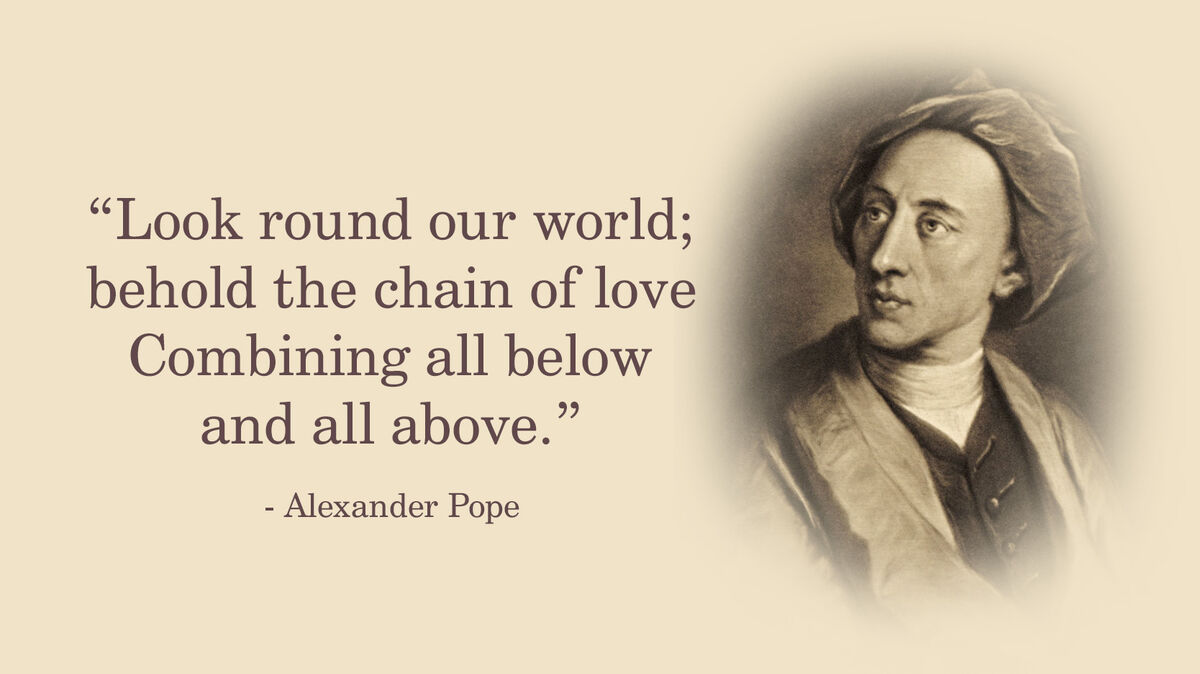
English poet Alexander Pope (1688-1744) often wrote satirical poems to present commentary on society and human nature. His contributions to the Neoclassical movement of the early 18th century serve as a masterclass in heroic couplets and narrative poetry.
Quotes From An Essay on Criticism
In An Essay on Criticism (1711), Pope explores what makes a critic a good critic. His use of the heroic couplet (10-syllable, iambic pentameter, rhyming couplets) throughout showcases his favor for the rhyme scheme.
“A little learning is a dangerous thing.”
“To Err is humane; to Forgive, Divine.”
“For fools rush in where angels fear to tread.”
“Let such teach others who themselves excel, / And censure freely who have written well.”
“Be sure your self and your own reach to know, / How far your genius, taste, and learning go; / Launch not beyond your depth, but be discreet, / And mark that point where sense and dulness meet.”
“So vast is art, so narrow human wit”
“Great wits sometimes may gloriously offend, / And rise to faults true critics dare not mend”
“All seems infected that th' infected spy, / As all looks yellow to the jaundic'd eye.”
“Men must be taught as if you taught them not; / And things unknown proposed as things forgot.”
“The learn'd reflect on what before they knew: / Careless of censure, nor too fond of fame, / Still pleas'd to praise, yet not afraid to blame, / Averse alike to flatter, or offend, / Not free from faults, nor yet too vain to mend.”
Quotes From The Rape of the Lock
Written as a mock-heroic narrative poem based on a true event, The Rape of the Lock (1714) shares a witty story of a woman’s lock of hair being stolen by a man. This humorous look at high society provides nuggets of wisdom for people of all standings.
“Now lap-dogs give themselves the rousing shake, / And sleepless lovers, just at twelve, awake”
“Bright as the sun, her eyes the gazers strike, / And, like the sun, they shine on all alike.”
“This to disclose is all thy guardian can: / Beware of all, but most beware of Man!”
“If to her share some female errors fall, / Look on her face, and you'll forget 'em all.”
“Oh thoughtless mortals! ever blind to fate, / Too soon dejected, and too soon elate.”
“But when to mischief mortals bend their will, / How soon they find fit instruments of ill!”
Quotes From The Dunciad
Initially published anonymously in 1728, The Dunciad is another mock-heroic poem written in iambic pentameter. The poem was meant as a response to Lewis Theobald’s attack on him in Shakespeare Restored, which might be why Pope didn’t lay claim to the work until 1735.
“How parts relate to parts, or they to whole, / The Body’s harmony, the beaming Soul”
“Lo! thy dread empire, Chaos! is restor’d; / Light dies before thy uncreating word”
“In cold December fragrant chaplets blow, / And heavy harvests nod beneath the snow.”
“How random thoughts now meaning chance to find, / Now leave all memory of sense behind”
“Then raptures high the seat of Sense o’erflow, / Which only heads refin’d from Reason know.”
“In vain, in vain—the all-composing hour / Resistless falls; the Muse obeys the power.”
Quotes From An Essay on Man
The four Epistles in An Essay on Man (1733-1734) were originally meant to be part of a much larger work Pope was unable to finish. They explore the relationships between people and themselves, people and other people, and humanity and the divine.
“Judges and senates have been bought for gold, / Esteem and love were never to be sold”
“Awake, my St. John! leave all meaner things / To low ambition, and the pride of kings. / Let us (since life can little more supply / Than just to look about us and to die) / Expatiate free o’er all this scene of man; / A mighty maze! but not without a plan”
“In faith and hope the world will disagree, / But all mankind’s concern is charity: / All must be false that thwart this one great end; / And all of God, that bless mankind or mend.”
“So man, who here seems principal alone, / Perhaps acts second to some sphere unknown”
“Then say not man’s imperfect, Heaven in fault; / Say rather man’s as perfect as he ought: / His knowledge measured to his state and place; / His time a moment, and a point his space.”
“Two principles in human nature reign; / Self-love to urge, and reason, to restrain”
“Look round our world; behold the chain of love / Combining all below and all above.”
“That reason, passion, answer one great aim; / That true self-love and social are the same; / That virtue only makes our bliss below; / And all our knowledge is, ourselves to know.”
Produce Poetry to Ponder
Alexander Pope was a master poet, but you could become one too with a little guidance!